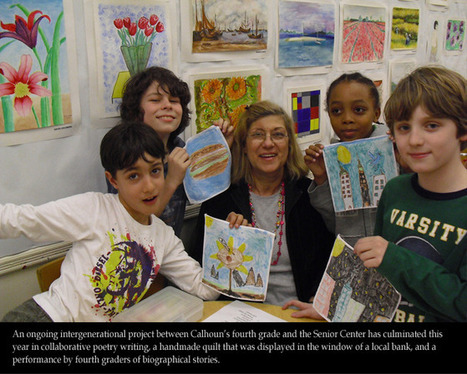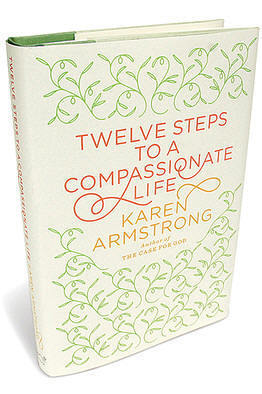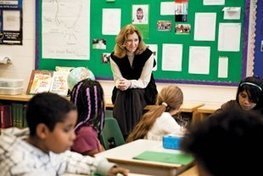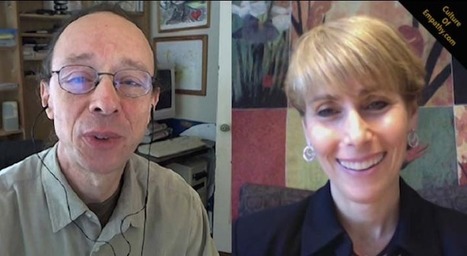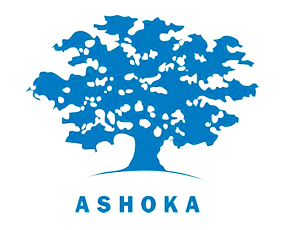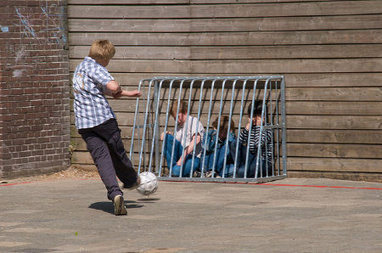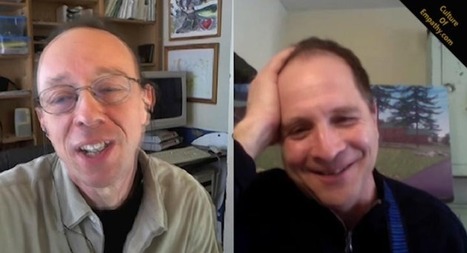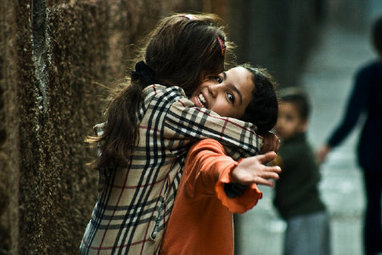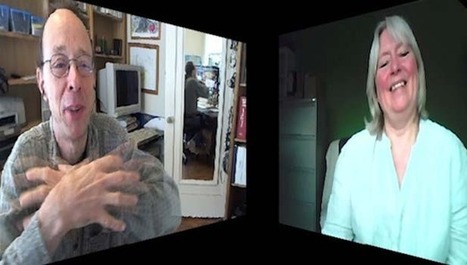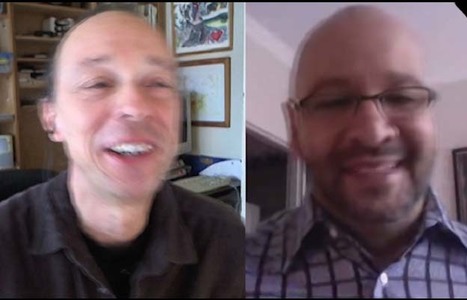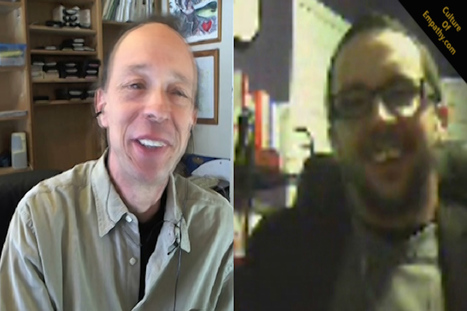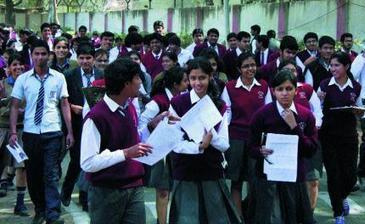 Your new post is loading...
 Your new post is loading...

|
Scooped by
Edwin Rutsch
March 30, 2012 2:05 AM
|
Rather than think of empathy as an ingredient in education – think of education and its disciplines – from history to literature to the arts – as ingredients in empathy. - Steve Nelson, Head, Calhoun When Steve Nelson meets with prospective parents weighing whether or not to send their kids to Calhoun, he likes to start with a little exercise. After they’ve gathered in the school auditorium, he poses a simple challenge: “I want you to think of the one or two qualities you want your children to exemplify in their lives, and then speak them out loud.” A few seconds go by. And then the words start coming: Honesty. Compassion. Integrity. Empathy. Leadership. Imagination.

|
Scooped by
Edwin Rutsch
March 28, 2012 6:21 PM
|
Ashoka Changemakers, the online community for social entrepreneurs and changemakers organized a Twitter based chat on ‘Activating Empathy’ on March 20, 2012. This online discussion was part of Ashoka Changemakers latest collaborative competition titled Activating Empathy: Transforming Schools to Teach What Matters.

|
Rescooped by
Edwin Rutsch
from Empathy Movement Magazine
March 19, 2012 1:57 PM
|
The problem is that by approaching this as a question of sympathy it's all about how the speaker thinks the world should work, and the speaker's frustration that the world's not working that way..... Empathy helps us see the challenge from different perspectives. It lets us consider why those who oppose our noble efforts might see things differently, better understand their concerns, and perhaps identify opportunities to solve problems together. By abandoning sweeping proclamations for specific queries, it allows us to isolate opportunities for agreement and the more limited number of places where we'll need to have the knock-down, drag-out fights. Empathy is ultimately the difference between cage-busters who implode amidst endless battles and those who, studying their Sun-Tzu, operate with determination and deliberation. by Education policy maven Rick Hess of the Conservative American Enterprise Institute think tank.

|
Scooped by
Edwin Rutsch
March 14, 2012 9:45 PM
|
World-renowned author and 2008 TED Prize recipient Karen Armstrong will make her inaugural ‘State of the Charter for Compassion’ address during her ‘Twelve Days of Compassion’ visit, hosted by Simon Fraser University’s Centre for Dialogue.
The address will take place immediately following her free public lecture on March 22, entitled ‘What is Religion,’ at Gladstone Secondary School. It will detail progress made around the world to re-centre society on compassionate action and create a more peaceful planet.
Armstrong’s presentation will include stories from Pakistan, Jordan, Kentucky and Vancouver and will discuss a global call to action with “Assignment Compassion,” and will unveil the redesigned Charter for Compassion website – the new hub for this movement, now more than 80,000 members strong.

|
Scooped by
Edwin Rutsch
March 12, 2012 2:35 PM
|
A grade-four class is gathered around a blanket, intent as Mei, a six-month-old baby girl, stretches to reach a toy. One boy smiles and cheers baby Mei on: “Come on, come on!” His brow furrows with concern as little Mei does a face plant, and then relaxes after she’s comforted with a reassuring look and pat from Mom. When Mei finally triumphs and reaches the toy, the kids clap and squeal with delight. This scene is an almost daily occurrence with Roots of Empathy, an award-winning program developed by Newfoundland-born educator Mary Gordon.

|
Rescooped by
Edwin Rutsch
from Empathy Movement Magazine
March 11, 2012 1:37 PM
|
Stan Davis has worked for human rights in many different ways. In the 1960s he worked in the US Civil Rights movement. As a social worker and child and family therapist in the 1970s and 1980s, he worked with abused, traumatized, and grieving children and trained Child Protective Workers.
Website: StopBullyingNow.com

|
Rescooped by
Edwin Rutsch
from Empathy Movement Magazine
March 11, 2012 1:37 PM
|
Dara Feldman is Director of Education and a Master Facilitator for The Virtues Project, offering keynotes, workshops and retreats transforming school culture and empowering students, educators and families to thrive.

|
Scooped by
Edwin Rutsch
March 8, 2012 1:24 PM
|
Activating Empathy: Transforming Schools to Teach What Matters is a competition introduced by Ashoka Changemakers in order to ensure that children master empathy, enabling them to be effective citizens, leaders and trailblazers. Ashoka is launching a global initiative to ensure that children master empathy, enabling them to be effective citizens, leaders and trailblazers. Empathy is a critical skill in a world defined by rapid change – one that is foundational to the social, teamwork and leadership skills required to contribute successfully to society. The main aims of this award are to: Encourage social and emotional development
Promote community diversity and a respect for differences
Unlock new ways of viewing problems, opening the door to a new world of potential solutions
Address bullying or aggression in ways that advance understanding of others’ perspectives
Champion children as real-world problem solvers rather than simply bystanders

|
Scooped by
Edwin Rutsch
March 6, 2012 6:13 PM
|
EDUCATION NEWS: New Empathy Training Lesson For Schools. Bullying, low self-worth, loneliness, isolation, depression, and suicidal thoughts have been continuing unabated among children and youth in classrooms everywhere. "Learn Counseling: Building Skills for Caring," with ten practical exercises, is easy to use and clearly explained for direct and immediate application. Copies of the PDF lesson may be made by teachers and schools at no charge. Free consultation and support is provided by the author Daniel Keeran, MSW, with over 30 years experience in hospital and private practice. Designed primarily for the classroom and initially used to train professional counselors, the practical exercises for acquiring empathy skills contained in this book can be also used for the benefit of couples, families, people in counseling, and in the workplace.

|
Scooped by
Edwin Rutsch
March 5, 2012 12:22 AM
|
Instead of teachers and parents looking for red flags from individual students, schools need a broader cultural shift. Psychologist and family counselor Dr. Kenneth Shore says it’s not enough for school districts to write "zero-tolerance" anti-bullying policies or hold a special assembly. Instead, he recommends that every school form a standing committee made up of students, parents, and school staff to be responsible for planning and implementing a prevention program. Shore also says it’s crucial for educators to take time out from their lessons to hold special classroom meetings at which kids can discuss times they’ve been bullied, and to make the consequences of bulling clear to all students. by LIZ DWYER

|
Scooped by
Edwin Rutsch
February 16, 2012 7:28 PM
|
Our mission is to help lead the integration of mindfulness into education... Our in-school program brings dramatic improvements in concentration, attention, and empathy among students, while building a climate of calm in the classroom.... having a mind that is calm, focused, and empathetic allows children to increase their scholastic aptitude, particularly if they experience a high degree of stress outside of school.... Mindfulness Fundamentals
This class is for teachers, parents, psychologists and anyone who would like to learn mindfulness for themselves. This six-week course covers the basic techniques of mindfulness, and will help you build your own practice. The course is available both online and in-person. More… Curriculum Training
This second level training, based on the Mindful Schools Elementary School curriculum, explains how to teach mindfulness to children in a classroom setting. Lessons can easily be adapted for use at home, in afterschool programs, or in private therapy practice. More…

|
Scooped by
Edwin Rutsch
February 12, 2012 5:43 PM
|
With the passage of health-care reform, President Obama has turned his attention to reforming education in America. In his State of the Union Message, he called for a significant increase in support for his "Educate to Innovate" campaign, which puts renewed emphasis on science, technology, engineering, and mathematics to ensure "our nation's economic competitiveness." The goal, according to the White House, is to equip every student with the knowledge that he or she needs to become a productive worker in the global economy... Historians tell us that empathy is the social glue that allows increasingly individualized and diverse populations to forge bonds of solidarity across broader domains so that society can cohere as a whole. To empathize is to civilize.

|
Scooped by
Edwin Rutsch
February 9, 2012 11:34 AM
|
A CAMBUSLANG woman last week took her fourth session at a primary school in a project aimed at teaching empathy to children.
Babies are being employed as “tiny teachers” in classrooms throughout South Lanarkshire as part of a pioneering Action for Children programme to reduce levels of bullying and aggression in schools.
Birch Drive resident Alison Gilroy, mum of six-month-old Jacob, volunteered to help out after hearing of the programme.
Roots of Empathy - ‘empathy’ being the ability to identify and understand another’s feelings - is being rolled out in nine primary schools in the region,..
|

|
Rescooped by
Edwin Rutsch
from Empathy Movement Magazine
March 29, 2012 4:44 PM
|
Author, Teaching Empathy: A Blueprint for Caring, Compassion, and Community "Empathy education is one of the most critical educational issues of our time because it is only when students feel emotionally safe and secure in all areas of the school environment—in the classroom, hallway, or cafeteria; at recess; and on the bus—that they will begin to focus and tap into the unlimited potential that lies within each of them. "

|
Scooped by
Edwin Rutsch
March 25, 2012 1:43 PM
|
High school students are cool. At least that’s the sentiment among the third-graders who Staples senior Izzy Baker interacts with as a student leader in the Kool to be Kind anti-bullying program being piloted in two Westport elementary schools. ...Rather than having adults try to teach children about the importance of being kind, the program uses trained high school students to teach interactive lessons that promote kindness, empathy and the creation of allies. by Vanessa Inzitari

|
Rescooped by
Edwin Rutsch
from Empathy Movement Magazine
March 18, 2012 5:10 PM
|
Strong academic skills aren't enough to guarantee success for 21st-century students. Now, one group is looking to broaden what our children are taught. Ashoka Changemakers, a nonprofit that provides tools and resources to help people improve their communities, is looking for entries for "Activating Empathy," a competition seeking to spotlight and support smart ideas, programs, and learning models that build students' abilities to collaborate and communicate effectively, resolve conflicts, and respect multiple perspectives. by LIZ DWYER

|
Scooped by
Edwin Rutsch
March 14, 2012 8:42 PM
|
et's explore how Rapport unfolds into empathy as an ability once it is a skill. This video extends our dialog in the Activating Empathy: Transforming Schools To Teach What Matters. AKRNA's entry is:
Rapport Driven Education: A Collaborative Paradigm of Intelligent Design | Building a Stable Track for Intentional Results AT: http://www.changemakers.com/node/127992/ and visit www.akrna.com for in depth information about systems change, new breed of teachers called Mateas, and values of rapport driven education!

|
Rescooped by
Edwin Rutsch
from Empathy Movement Magazine
March 11, 2012 1:38 PM
|
Bridget Cooper is Professor of Education at the University of Sunderland in the UK. Bridget has taught for 31 years in schools, adult education and Higher Education in various capacities across the age and attainment range.
Author: Empathy in Education: Engagement, values and achievement

|
Rescooped by
Edwin Rutsch
from Empathy Movement Magazine
March 11, 2012 1:37 PM
|
Noble Kelly from Education Beyond Borders, a non-profit NGO devoted to closing the education divide through teacher professional development and community education.

|
Rescooped by
Edwin Rutsch
from Empathy Movement Magazine
March 10, 2012 5:04 PM
|
How can we foster empathy in the education system? Check out this interview with Joan Duffell. She had a lot of wonderful insights, built on a wealth of experience, to share on this question. Joan Cole Duffell is Executive Director of Committee for Children, an international nonprofit organization dedicated to the safety, well-being and social development of children through the provision and support of research-based educational programs for educators, families and communities.

|
Rescooped by
Edwin Rutsch
from Empathy Movement Magazine
March 11, 2012 1:37 PM
|
'The mission of the Empathy Factory is to instil a sense of empathy and a philanthropic spirit in Nova Scotia’s youth. To build a generation of generous, conscientious humanitarians. To empower children to effect the world and be socially conscious global citizens'

|
Scooped by
Edwin Rutsch
March 6, 2012 11:35 AM
|
Dr Geetanjali Kumar, counsellor and psychologist, says, “Teachers need to learn to empathise with students. Remarks like isse to hoga nahi (he can’t do it), yeh weak student hai (he’s a weak student) can be extremely discouraging for some kids. Children are naughty and it’s their basic nature to defy rules but they have to be handled very carefully. The idea is to be sensitive towards them.”
Consultant psychologist and counsellor Ritu Dhingra points out that the reason behind this attitude could be bottled up frustration and an inferiority complex.
by Shruti Badyal (The Asian Age)

|
Rescooped by
Edwin Rutsch
from Empathy Movement Magazine
February 17, 2012 4:36 PM
|
A conversation with Sonali Ojha, Ashoka Fellow and founder of the Dreamcatchers Foundation
Ashoka: How do you build a school culture in which empathy is practiced daily? Ojha: One of the things that’s very important in terms of transforming a school, or inviting the empathy piece into parents’ teachings, is that people need to understand that empathy is not about, “let’s take 20 minutes today and be empathetic.” It’s about creating a spiraling level of activity and engagement in school life, where no matter where you go. From the moment you walk into the school to the time you leave the school, no matter the nature of your engagement, you are invariably asked questions and placed in positions and placed in dichotomies where you will be forced to transact empathetically.

|
Rescooped by
Edwin Rutsch
from Empathy Movement Magazine
February 15, 2012 12:00 PM
|
Ashoka is launching a global initiative to ensure that children master empathy, enabling them to be effective citizens, leaders and trailblazers. Empathy is a critical skill in a world defined by rapid change–one that is foundational to the social, teamwork and leadership skills required to contribute successfully to society. Activating Empathy: Transforming Schools to Teach What Matters, the challenge is open to teachers, principals, parents, students, and other innovators to share ideas—whether by a project, a program, or a new learning experience—for advancing empathy in education.

|
Scooped by
Edwin Rutsch
February 10, 2012 12:26 PM
|
The Roots of Empathy program running at various schools throughout the Division is planting the seeds of empathy and positive parenting in many of our elementary and middle school children.... “Roots of Empathy is an anti-bullying, positive parenting program that brings a baby and the baby’s family into the school to teach the students skills to deal with bullies and to recognize a bully and also teach the student positive parenting skills as well,” said Ross.
|



 Your new post is loading...
Your new post is loading...

